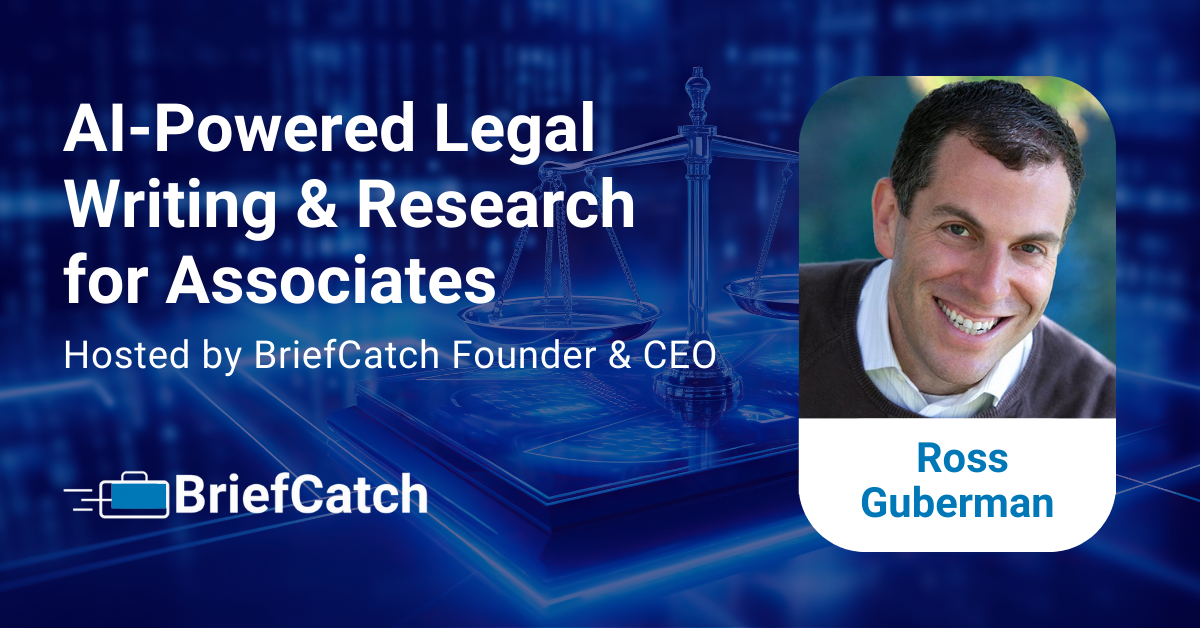On Thursday, June 27, BriefCatch hosted an insightful webinar titled "AI-Powered Legal Writing & Research for Summer Associates," hosted by Ross Guberman, BriefCatch's Founder and CEO. We had over 150 registered, eager to learn about integrating AI into legal writing and research.
Opening Remarks
The session kicked off with Lydia Flocchini, BriefCatch's CMO, welcoming participants and introducing the host, Ross Guberman. Lydia highlighted BriefCatch’s mission to help legal professionals achieve excellence in their writing, ensuring every document meets the highest standards of the field.
The Role of AI in Legal Writing
Ross began by discussing his passion for legal tech and AI, sharing his extensive experience in teaching and conducting workshops worldwide. He addressed the common anxieties around AI, emphasizing the importance of practical use and experimentation over preconceived notions. Ross encouraged attendees to immerse themselves in AI tools, sharing his belief that those who do often see fantastic results.
Practical Use Cases
Ross then delved into several use cases, demonstrating how AI can assist in legal research and writing:
- Research Use Case: Landscaping or Not? Ross showcased how AI can expedite legal research using a recent case involving an in-ground trampoline. By using AI tools like ChatGPT, legal professionals can quickly generate arguments and interpretations, saving time and providing fresh perspectives.
- Comparison Analysis: Supreme Court Opinions. He demonstrated how AI can compare lengthy documents, like Supreme Court opinions, breaking down the main points of agreement and disagreement. This capability is invaluable for busy lawyers needing to grasp complex cases swiftly.
- Contract Analysis. Ross showed how AI can analyze contracts for potential risks. By adapting the AI’s role to specific personas, such as a general counsel or a summer associate, users can get tailored insights and risk assessments.
Addressing Concerns About AI
Ross also tackled the hot topic of AI "hallucinations," where AI generates false or misleading information. He stressed the importance of context and prompting the AI with information about who you are, as well as very specific facts and information to ensure comprehensive outputs. He reassured attendees that while AI is not foolproof, proper use and checks can mitigate risks significantly.
Improving Legal Writing with AI
Transitioning from research to writing, Ross highlighted how AI can enhance legal documents by:
- Identifying logical gaps
- Suggesting more persuasive headings
- Preempting counterarguments
- Shortening and better introducing quotations
Conclusion and Q&A
The webinar concluded with a lively Q&A session, where Ross answered questions about AI tool usage, data confidentiality, and the future of AI in legal tech. He emphasized the importance of continuous learning and adaptation, encouraging attendees to explore and utilize AI tools to their fullest potential.
Watch the Recording
If you missed the webinar or want to revisit the insights shared, you can watch the full recording here. Don't miss this opportunity to enhance your legal writing and research skills with the power of AI!
Stay tuned for more webinars and tips from BriefCatch, and join our community on LinkedIn for the latest updates and expert advice.




.svg)



.svg)

.svg)

.svg)